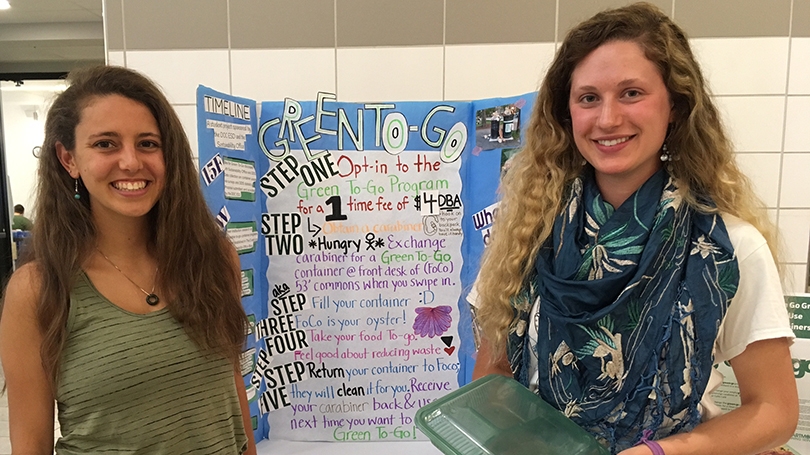
- About
- Departments
- Construction on Campus
- Service Requests
Back to Top Nav
Back to Top Nav
“I think of food waste as something that can be personally solved,” says Madison Sabol ’18.
Takeout meals have become a way of life for busy people, and Dartmouth students are no exception. “Students like to eat outside, or sometimes in their rooms, so they buy meals to go from dining halls,” says Madison Sabol ’18. Nothing wrong with dining in dorms or al fresco, she says, but it troubles her to see so much wasted plastic. Sure, it’s recyclable, but she would rather see people use containers that can be washed and filled again.
It took her two years, but Sabol has come up with a way to help solve the problem.
In her sophomore year, Sabol began working with the Dartmouth Office of Sustainability and Dartmouth Dining Services on a more environmentally friendly package for take-out food. Step one: researching why the campus generates all that waste to begin with—400-600 containers each mealtime. Through surveys, both online and in person, Sabol found out that students choose takeout for a variety of valid reasons, and that many share her desire to waste less plastic.
Sabol also learned that other colleges and universities, including Harvard, Oberlin, McGill, Tulane, and Columbia, distribute reusable plastic food containers sturdy enough to survive industrial dishwashing and microwaving. With three compartments and a snug-fitting lid, the “ECO-Takeout” box used on several campuses is stackable and slim enough to fit into a backpack. To Sabol, it looked like an ideal to-go container.
Last July, she recruited 12 students to participate in what turned out to be a successful pilot project. Now, “Green2Go” boxes are available at the Class of 1953 Commons dining hall, at Novack Café, and Collis Café.
On a summery evening at ’53 Commons, standing in front of a table displaying a light green sample box beneath an explanatory poster, Sabol and her friend Alexandra Sclafani ’18 persuade diners to buy into Green2Go by swiping a meal card or paying with credit or cash at the front desk.
“Here’s how it works,” Sabol explains to Kate Domin ’19 and Juli Montoya ’19 when they linger by the display. “For a one-time investment of $4 you get one of these reusable containers. You fill it with food, and when you’re finished eating you can bring it back to any dining location on campus.”
Green2Go members can exchange their used boxes for clean ones. Or, Sabol explains, instead of getting a new container, a person can take a token—a carabiner—that can be turned in for a box at a later date. “When you return a box, you can get one of these”—she holds up a metal loop with a spring-loaded latch—“and the next time you want a clean container, you just show the carabiner, which you can keep hooked to your backpack so you don’t lose it.”
Sabol says the boxes, which will be sold at close to cost, are expected to save up to $20,000 for the Dining Services per year, freeing up money, perhaps, for more local food offerings.
“I think this is a cool idea,” says Domin, who plans to join the program.
Apparently, she is not alone. During her three-hour demo, Sabol got thumbs up on Green2Go. “There have been so many positive responses,” she says. “Students have been coming up all evening, saying, ‘Thank you for doing this.’”
The real proof will come in the pudding, or yogurt, or whatever else lands in the boxes. It remains to be seen how many will be returned and exchanged for clean ones. But Sabol is optimistic because, she says, this is one step every student can take, every day, to shrink Dartmouth’s carbon footprint.
“I think of food waste as something that can be personally solved. You have the capability to change your habits and your actions,” she says. “I see reusable to-go containers as a way to solve a huge problem Dartmouth has, and every time we buy a meal, we can shrink waste as much as possible.”
Sabol says she’s learned from this project how to work with several campus groups to bring about change.
“Green2Go would not have been possible without support from students in the Environmental Conservation Organization (ECO), who helped me with my research. The DOC Environmental Studies Division gave me the $1,000 grant to get the pilot program started, and Dartmouth Dining Services has also been incredibly helpful,” Sabol says. “Rosi Kerr ’98 and Jenna Musco in the Office of Sustainability were my biggest cheerleaders from the beginning.”
In addition to using less plastic, Dining Services is trying to reduce food waste. Crews compost close to 100 percent of what is not eaten, but on its website, DDS urges diners not to overfill their plates. “Between 30 and 40 percent of all food in the United States ends up in landfills and composting bins each year,” says DDS. “Make the sustainable choice and take less on your first trip. You can always go back for more!”
And now Dartmouth diners can also take food out in a box that’s green, in more ways than one.